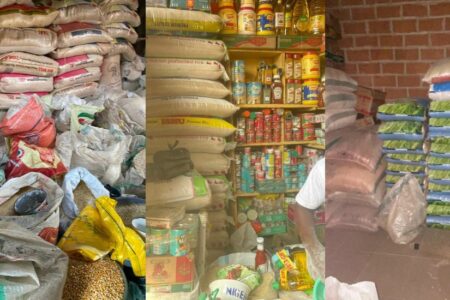News
CHRISTMAS: Nigerians May Pay More For Rice By December

As Christmas approaches, Nigerians are facing the prospect of paying N60,000 or more for a 50kg bag of rice. This is due to several factors, including the removal of fuel subsidies, banditry, flooding, and unstable foreign exchange.
A market survey by THE WHISTLER revealed that the price of rice has increased significantly in recent months. In Abuja, a 50kg bag of Nigerian rice now sells for N49,000, up from N34,000 three months ago. Foreign rice is even more expensive, selling for N55,000, up from N37,000 in July.
Rice dealers say that the high cost of transportation, banditry, ban on foreign rice, and flooding are all contributing to the rising price of the commodity. They also say that demand for rice is expected to increase in the lead-up to Christmas, which could further push up prices.
“I can’t say for sure what the price of a 50kg bag of rice will be by December, but if things continue to go high, it could go above N60,000,” said Yahaya, a rice dealer at the Kubwa market in Abuja.
Yahaya, a rice dealer at Kubwa Market
The high price of rice is a major concern for many Nigerians, who rely on it as a staple food. It is particularly concerning for low-income households, who may struggle to afford rice at all during the holiday season.
OTHER FOOD PRICES ARE ALSO RISING
The price of rice is not the only food item that has become more expensive in recent months. Other staples, such as beans and groundnut oil, have also seen significant price increases.
According to a report by the National Bureau of Statistics (NBS), the average price of a 50kg bag of rice increased by 28.32% between January and September 2023. The price of a 70kg bag of beans increased by 17.16% over the same period, while the price of 25 litres of groundnut oil increased by 20.87%.
The NBS report also showed that the overall inflation rate in Nigeria rose to 22.04% in September 2023, up from 17.01% in January. This means that the prices of most goods and services in Nigeria have increased significantly in recent months.
At the Wuse market, another rice dealer who identified himself as Umar Abubakar lamented the high cost of transportation, among others, as partly responsible for the high prices of rice in the country.
“Now that rice is like gold, some people no longer buy a bag of rice as they used to, what they do is to buy in Mudu. The country is hard, and even we the rice sellers find it hard to get rice, everything is now costly. Transportation has tripled, bandits won’t let farmers go to farm, borders are closed and we don’t produce enough.
“That’s why rice, beans, and other things keep going up, with 50kg of foreign rice going for N55,000 and our local Rice N49,000, how many people can afford it except for the rich?” Umar said.
He added that by December, people who can afford to buy a bag of rice may pay as much as “N57,000 and above.”
Umar, a rice dealer at Wuse Market
On his part, Ahmed a rice dealer at Dutse market gave a similar account.
“Foreign rice now is N55,000 it used to be like N37,000/N38,000 about four months ago, and Nigeria rice was N34,000 but now it’s N48,000,” he said.
Our correspondent spoke to some rice dealers in Abakaliki, Ebonyi State, who said a bushel (25kg) of rice now costs between N19,500 and N20,000, while 50kg of local rice can be purchased for N45,000 to N47,000 depending on the variety.
A rice merchant from Abakaliki, who gave his name as Gabriel, told THE WHISTLER that flooding and transportation are contributing factors.
“The scarcity is driven by flooding, subsidy removal, and increased demand. However, there is hope that prices will decrease once the new rice harvest begins.
“It may be challenging for economically disadvantaged individuals to afford rice in December due to rising costs of commodities, fuel, and exchange rates. A bushel of rice now costs between N19,500 and N20,000, while 50kg of local rice can be purchased for N45,000 to N47,000 depending on what type of grain you want.”
IMPACT ON HOUSEHOLDS
The rising cost of food is having a significant impact on households in Nigeria. Many people are struggling to afford to feed their families, and some are having to cut back on essential items such as food and healthcare.
The government has taken some steps to help some Nigerians cope with the rising cost of living such as providing palliatives to vulnerable househoulds.
Others include increasing social safety nets, providing targeted subsidies to low-income households, and investing in agriculture to boost domestic production but the impact of these measures have not been felt by the masses.
Source: THE WHISTLER
-

 News2 days ago
News2 days agoOsun Communal crisis: Slain NSCDC operative Buried Amid Tears [Photos]
-

 News4 days ago
News4 days agoKings Worshipping Idols Are Herbalists-Oluwo
-

 News3 days ago
News3 days agoFIDA Calls For Prosecution Of Medical Doctor Accused Of Raping Teenage Admission-seeker In Osun
-

 News2 days ago
News2 days agoNSCDC Officer Killed, Palace Burnt, Others Injured As Communal Clash Erupts In Osun Communities








![Just In] Hajj 2024: Saudi King Honours 30 Nigerians As Guests](https://citymirrornews.com/wp-content/uploads/2024/06/IMG-20240610-WA0006-400x240.jpg)
![Just In] Hajj 2024: Saudi King Honours 30 Nigerians As Guests](https://citymirrornews.com/wp-content/uploads/2024/06/IMG-20240610-WA0006-80x80.jpg)



